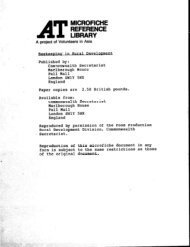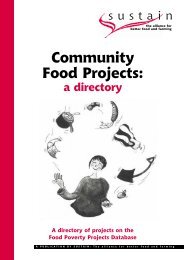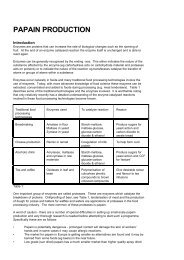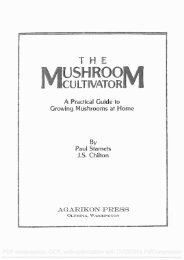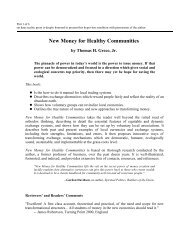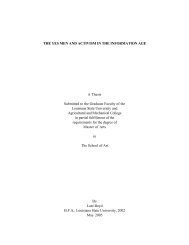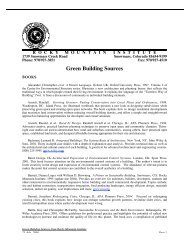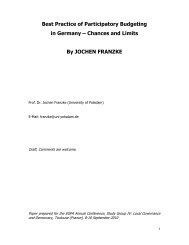- Page 1 and 2:
Healthy Money Healthy Planet by Dei
- Page 3 and 4:
2 During the 1960s I listened on th
- Page 5 and 6:
4 money. Richard’s enthusiasm for
- Page 7 and 8:
6 must first be complemented by mon
- Page 9 and 10:
6 For over a decade, Japan struggle
- Page 11 and 12:
8 interestbearing money creation.
- Page 13 and 14:
10 provides a benefit for seller an
- Page 15 and 16:
2 After that, it didn’t take long
- Page 17 and 18:
4 Bank B. This is called a ‘depos
- Page 19 and 20:
6 Second comes the bit where banker
- Page 21 and 22:
8 debt, hence the collective debt c
- Page 23 and 24:
10 simply unsustainable in a finite
- Page 25 and 26:
12 pieces of paper grant the bearer
- Page 27 and 28:
14 master of all industry and comme
- Page 29 and 30:
16 Money Supply 1935 - 2000 120000
- Page 31:
18 commercial banks and is lent int
- Page 34 and 35:
2 And nor are things getting any be
- Page 36 and 37:
4 international trade in currencies
- Page 38 and 39:
6 The data on New Zealand mortgage
- Page 40 and 41:
8 The scheme has had unintended soc
- Page 42 and 43:
10 Household loans (1978-2000) 90 8
- Page 44 and 45:
12 City Council in mid2000 review
- Page 46 and 47:
14 Similarly, mortgages are classif
- Page 48 and 49:
16 And it is not just bank assets t
- Page 50 and 51:
18 Keeping the Secret But surely if
- Page 52 and 53: 20 Deputy Prime Minister. I asked h
- Page 54 and 55: 22 Individuals have to compete with
- Page 56 and 57: 24 instability. This speculation is
- Page 58 and 59: 51 cared for. The cancerous parts o
- Page 60 and 61: 53 constraints. What we need are so
- Page 62 and 63: 55 accelerating. Eighty per cent of
- Page 64 and 65: 57 waters to draw down. They also s
- Page 66 and 67: 59 As far back as 1987, a UN World
- Page 68 and 69: 61 The State of New Zealand Since 1
- Page 70 and 71: 63 Health and Disability Like other
- Page 72 and 73: 65 Low skilled jobs have largely di
- Page 74: 67 • One in two people in Ireland
- Page 77 and 78: 1 4 Unhealthy Globalisation The Sir
- Page 79 and 80: 3 Although the process of corporate
- Page 81 and 82: 5 globalisation is transnational ca
- Page 83 and 84: 7 Many others have spoken of invisi
- Page 85 and 86: 9 currencies to the US dollar. The
- Page 87 and 88: 11 policies of these nations in ret
- Page 89 and 90: 13 000). Round Tables The original
- Page 91 and 92: 15 annual meeting in the small ski
- Page 93 and 94: 17 When an enemy is powerful and ce
- Page 95 and 96: 19 In January 2001, protesters demo
- Page 97 and 98: Martin Khor, Direitn 21
- Page 99 and 100: 78 Every day we hear politicians, c
- Page 101: 80 not return to the depression of
- Page 105 and 106: 84 which in turn rests on nature it
- Page 107 and 108: 86 increase. And when jobs are crea
- Page 109 and 110: 88 rather than adding them to the w
- Page 111 and 112: 90 achieved very different levels o
- Page 113 and 114: 92 placed at the top of the lists.
- Page 115 and 116: 88 6 Facing the Critics Through the
- Page 117 and 118: 90 the interestbased system, the
- Page 119 and 120: 92 good or fair or sustainable. An
- Page 121 and 122: 94 Certainly there are other ways o
- Page 123 and 124: 96 landlord who charges you rent al
- Page 125 and 126: 98 believe that credit to be valuab
- Page 127 and 128: 100 If interest rates were zero the
- Page 129 and 130: 102 It is quite fair that banks sho
- Page 131 and 132: 2 free money before, as we shall se
- Page 133 and 134: 4 In precolonial times, Maori tri
- Page 135 and 136: 6 In Maori tribes, the gift society
- Page 138 and 139: 9 What Gives Money its Value? To he
- Page 140 and 141: 11 accept money as payment, we unco
- Page 142 and 143: 13 goes still further and calls mon
- Page 144 and 145: 15 Spanish and Dutch coins from ove
- Page 146 and 147: 17 claimed that the UK’s financia
- Page 148 and 149: 19 Today, the Reserve Bank retains
- Page 150 and 151: 2 living systems. Finally, it discu
- Page 152 and 153:
4 If our species is to survive, a n
- Page 154 and 155:
6 with its own currencies, the patt
- Page 156 and 157:
8 While it is possible for each tea
- Page 158 and 159:
10 addiction, chronic illness and i
- Page 160 and 161:
12 4. Human economies can and shoul
- Page 162 and 163:
14 furniture transported at great c
- Page 164 and 165:
16 down and money has been moved ar
- Page 166 and 167:
18 areas? Is there a continuing dyn
- Page 168 and 169:
Some estimate the costs of traffic
- Page 170 and 171:
22 be a tension between the two. Th
- Page 172 and 173:
24 democracy at the local governmen
- Page 174 and 175:
26 as the individual organs of the
- Page 176 and 177:
2 The democratisation of national c
- Page 178 and 179:
4 her children who were fed by its
- Page 180 and 181:
6 happened - the imposition of a co
- Page 182 and 183:
8 existed and thrived for thousands
- Page 184 and 185:
10 In addition, by focusing on loca
- Page 186 and 187:
12 there is no hierarchy. As we saw
- Page 188 and 189:
2 Michael Linton, David Weston and
- Page 190 and 191:
4 could. He described them as ‘a
- Page 192 and 193:
6 resorts may find themselves amass
- Page 194 and 195:
8 problems. Since then, the system
- Page 196 and 197:
10 forms. In version 1, operating u
- Page 198 and 199:
12 All the following examples of co
- Page 200 and 201:
14 sent a researcher to check the w
- Page 202 and 203:
16 Salt Spring Island Dollars Salt
- Page 204 and 205:
18 British Columbia Financial Insti
- Page 206 and 207:
20 partnership. This trend has spre
- Page 208 and 209:
22 traditional rice planting and ha
- Page 210 and 211:
24 The city solicitor put the bigge
- Page 212 and 213:
26 In the next chapter on commercia
- Page 214:
28 43 Email from Eric Booth to Cal
- Page 217 and 218:
2 Enz, who were supporters of the f
- Page 219 and 220:
4 As with WIR, businesses are regis
- Page 221 and 222:
6 A significant innovation in New Z
- Page 223 and 224:
8 granting temporary credit where t
- Page 225 and 226:
10 requiring transactions to be 100
- Page 227 and 228:
12 participants of the scheme were
- Page 229 and 230:
14 Ideology of the Wirtshaftsring
- Page 231 and 232:
255 are already in possession of it
- Page 233 and 234:
257 that all hoards of money would
- Page 235 and 236:
259 sophisticated that Egypt became
- Page 237 and 238:
261 Austria, for a period of 14 mon
- Page 239 and 240:
263 US$260 million worth of work in
- Page 241 and 242:
265 Saving will become impossible.
- Page 243 and 244:
267 law professor in Italy. Profess
- Page 245 and 246:
269 The Chiemgauer 21 In early 2002
- Page 247 and 248:
271 Currency to Support Waldorf Sch
- Page 249 and 250:
20 It started in 1989 when Frank To
- Page 251 and 252:
22 Privately Issued Fiat Currencies
- Page 253 and 254:
24 The Note Corporation itself then
- Page 255 and 256:
26 andahalf years, A$3.5 millio
- Page 257 and 258:
2 of agricultural and mining produc
- Page 259 and 260:
4 such resource as fossil fuel, sin
- Page 261 and 262:
6 • The demurrage charge would re
- Page 263 and 264:
1 15 Lessons Learnt From Currencies
- Page 265 and 266:
3 Regardless of whether the transac
- Page 267 and 268:
5 payment of taxes. When the mayor
- Page 269 and 270:
7 within that global economy we mus
- Page 271 and 272:
9 Money can also be spent into exis
- Page 273 and 274:
11 Huber and James Robertson, 6 it
- Page 275 and 276:
13 apparently no one spread rumours
- Page 277 and 278:
15 One of the weaknesses of local c
- Page 279 and 280:
17 example (see page 000), the demu
- Page 281 and 282:
19 trading. We therefore need decen
- Page 283 and 284:
21 If citizens decide to build a se
- Page 285 and 286:
23 In Even if the Reserve Bank deci
- Page 287 and 288:
25 possibilities for reforming our
- Page 289 and 290:
27 1905. 2 Michael Reddell of the R
- Page 291 and 292:
2 Taxation Policies Before I discus
- Page 293 and 294:
4 But, like other assets, realest
- Page 295 and 296:
6 Most taxes fall on work. It makes
- Page 297 and 298:
8 slows down the increasing gap bet
- Page 299 and 300:
10 Bob Keall has also proposed taxe
- Page 301 and 302:
12 ways of avoiding paying tax. Tax
- Page 303 and 304:
14 Ltd, 1879. 3 Henry George, Socia
- Page 305 and 306:
2 of reserves, a single exchange ra
- Page 307 and 308:
4 revealed to show that they wanted
- Page 309 and 310:
6 Countries using the Australian do
- Page 311 and 312:
8 3 Helen Clark in an interview on
- Page 313 and 314:
2 community projects can be funded.
- Page 315 and 316:
4 feeling that the banks were not t
- Page 317 and 318:
6 terminals per 100,000 people, com
- Page 319 and 320:
8 to lend to groups rather than ind
- Page 321 and 322:
10 Islamic Banks Banks run along st
- Page 323 and 324:
12 decided to create an entirely ne
- Page 325 and 326:
14 Attempts to Start New Banks In 1
- Page 327 and 328:
16 During the local body election c
- Page 329 and 330:
18 Zealand Post was that there was
- Page 331 and 332:
20 Problem numbertwo — fees going
- Page 333 and 334:
22 Other microcredit schemes. A goo
- Page 335 and 336:
24 now operates are the Cooperati
- Page 337 and 338:
26 They donManchester Unity does no
- Page 339 and 340:
28 The Wellington Women’s Loan Fu
- Page 341 and 342:
30 The Future of Community Banking
- Page 343 and 344:
32 8 Quoted in ‘Banks Profit Exce
- Page 345 and 346:
34 45 Details of Consumers’ Insti
- Page 347 and 348:
2 created when commercial banks iss
- Page 349 and 350:
4 Fund (IMF) protect global corpora
- Page 351 and 352:
6 economic thinking and taxation sy
- Page 353 and 354:
8 It is not easy to start again and
- Page 355 and 356:
10 rest of the world, a US deficit
- Page 357 and 358:
12 competitive when the money syste
- Page 359 and 360:
14 environmentally friendly longt
- Page 361 and 362:
16 practitioners know a great deal
- Page 363 and 364:
18 moneycreation regime will natu
- Page 365 and 366:
20 international currencies. Some o
- Page 367 and 368:
22 and James Garfield have struggle
- Page 369 and 370:
24 away and the scientific programm
- Page 371 and 372:
26 Sources of Hope There are ground
- Page 373 and 374:
28 beneficial effects. Indigenous i
- Page 375 and 376:
30 taught me that some staff are re
- Page 377 and 378:
32 New Zealand’s isolation, humil
- Page 379 and 380:
34 • Visit Bali or Japan or any o
- Page 381 and 382:
36 Although such a system will not
- Page 383 and 384:
1 Ralph Chaplin Bars and Shadows. 2
- Page 385 and 386:
and narrated by Bill Still, and ava
- Page 387 and 388:
11 Lietaer, The Future of Money, p3
- Page 389 and 390:
37 Allison Stinson, ‘Developments
- Page 391 and 392:
4 Roy Madron and John Jopling, Gaia
- Page 393 and 394:
25 Viviane Forrester, The Economic
- Page 395 and 396:
2 Michael Rowbotham, The Grip of De
- Page 397 and 398:
25 Text of the Genoa G8 Summit, acc
- Page 399 and 400:
18 The Independent, 21 July 1999. 1
- Page 401 and 402:
14 Wolfgang Rosenberg, Money in New
- Page 403 and 404:
6 Fritjof Capra, The Web of Life: A
- Page 405 and 406:
11 Bernard Lietaer, ‘The Future o
- Page 407 and 408:
39 1.1 Warehouse receipts. (The fin
- Page 409 and 410:
41 2.3 By a commercial company, sma
- Page 411 and 412:
43 Summary of Complementary Currenc
- Page 413 and 414:
45 000) volunteers. Credits are put
- Page 415 and 416:
47 the currency generating enthusia
- Page 417 and 418:
140 Appendix 2: Useful Websites Gen
- Page 419 and 420:
142 writings of evolutionary biolog
- Page 421 and 422:
144 Green Dollars/LETS www.appropri
- Page 423 and 424:
146 www.earthsharing.org.au An Aust
- Page 425 and 426:
148 Email: bryank@earthsharing.org.
- Page 427 and 428:
Bibliography 1 Books and Chapters i
- Page 429 and 430:
3 Douthwaite, Richard, The Ecology
- Page 431 and 432:
5 Henderson, Hazel, Beyond Globaliz
- Page 433 and 434:
7 Mitchell, Ralph A., and Shafer, N
- Page 435 and 436:
9 Cobb, Clifford, ‘Displacing Bad
- Page 437 and 438:
Turnbull, Shann, ‘Why Reducing Ta
- Page 439 and 440:
The Guardian (UKbased daily) The
- Page 441 and 442:
1 Glossary Barter The direct exchan
- Page 443 and 444:
3 shared land ownership. Koha The M



